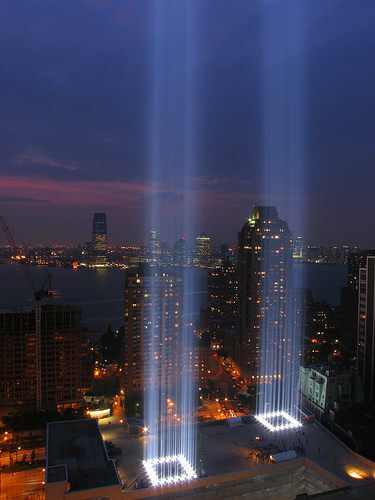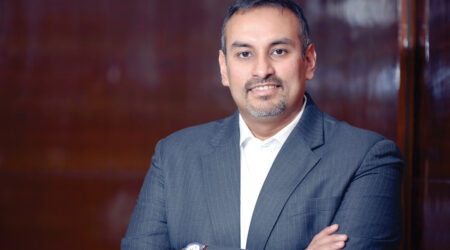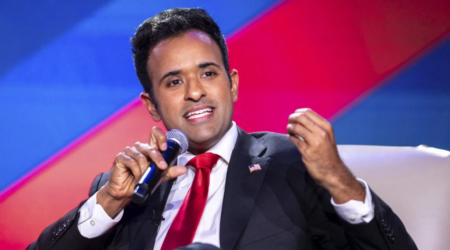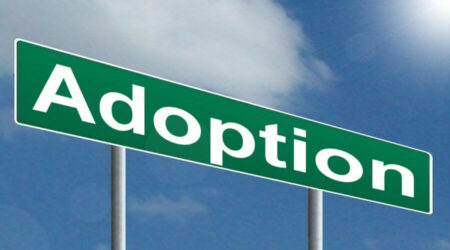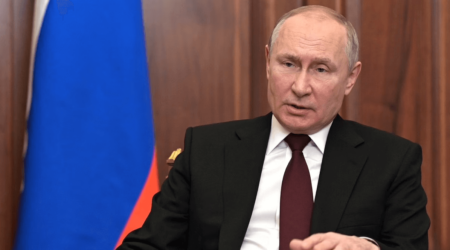By Neera Kuckreja Sohoni
As we commemorate the most terrible and tragic day in US and human history, our faith in the sanctity of what we did and continue to do to avenge it and prevent it from happening again is tottering. To what further cost to American lives and dwindling resources do we wish to commit to the war on terror: in search of an enemy that is devious, surreptitious, an ever moving target that can deplete our treasury, destabilize our polity and economy, perhaps even our democracy.

Imagine sitting inside the cool comfort of your office in a high rise building – counted among the architectural landmarks of New York – when a plane approaches, which seems to you and your colleagues to come too close but before you have a chance to re-assess, the plane crashes into the mighty North Tower of the World Trade Center. As it comes down, and before the evacuation order can be issued for its twin, the South Tower is hit and crumbles.
Those who saw the towers hit and collapse from afar or near, from the streets below or the neighboring rooftops, felt the crashes were accidental, a miscalculation by the pilots or the control room.
The devastation was unprecedented – with desperate people seeking to run out, rushing down endless staircases, many unable to make it to the last elevator or the ground, jumping from windows to the certainty of death, and countless left lying, with their lungs clogged and choked, struggling to breathe before falling silent.
Some stole precious seconds from their impending end to bid goodbye to their dear ones. Others simply vanished with little or no traces left of their bodies and identities.
As the city’s brave warriors – firemen and others – rushed to rescue the fallen and the injured, many were themselves sucked into the gaseous inferno. Others to this day carry the wounds of terminal cancer and other disabilities that continue to plague them for risking their all in doing their duty by others.
Devastation similarly followed the aerial attack on the Pentagon, and the failed attack that was intended to hit the US Congress, but was sabotaged by brave civilians who forced the pilot to crash the plane along with all its passengers.
Memorials mark all three sites that are graveyards of the innocent and heroic dead.
But grief is insatiable and relentless. The mourning we as one nation widely felt is deep and lasting as was the shock to America’s psyche and the security and comfort Americans had always drawn from this nation’s insularity. Being hit on American soil and that too, by foreign terrorists, who had received their training to fly our planes in American training schools, seemed grossly unjust. That the plausibility of attacks was not detected or deemed credible inflicted a punishing blow to the ego of those responsible for screening all incomers to the US, and forever shook our faith in the invincibility, astuteness, and thoroughness of the American intelligence apparatus.
Together the attacks were demeaning – challenging America’s incomparable standing as the most valorous and victorious nation of all nations, a sort of a superhuman superpower.
Since that infamous day, the wounds for families and the nation have never healed. Nor has time altered our country’s unforgiving resolve to hound and kill the perpetrators and all those who supported and nourished them, or continue to do so.
As the infamous date approaches, people are finding different ways to assess what the events of that day did to us, our society, and polity. The impact was manifold.
National unity is the first to benefit from a national crisis. Suddenly America’s vastness was not a hurdle to the feeling of oneness, as the pain of the slaughtered and their bereaved families was felt across the nation (barring some who may have perceived the attacks as just desserts in a vein similar to what current politicians such as Representative Ilhan Omar espouse today). Patriotism surged, sustained by the shared rage and fervor to avenge. Even Hollywood turned patriotic, churning out movies that heralded principled fight for freedom against those bent upon destroying it, eternally making good triumph over evil.
On the downside, immigrants became suspect, especially those of Islamic ethnicity. Anyone bearded, turbaned, or donning a burqa conveyed ‘Otherness’, becoming a source of discomfort and derision. National security turned personal. Air travel screening regulations increased, as one by one we agreed to take off our shoes, stop carrying liquids, and put our cell phones, computers, and partially undressed bodies to invasive electronic and human screening.
Over time, with people willing to exchange personal autonomy for collective security, America succumbed to exercising greater surveillance than ever before, an unfortunate development seen today in the Covid mandates and behavioral regimes that are being thrust upon, or willingly embraced by, us.
Amidst despair caused by insecurity, people took more to attending churches and seeking solace from faith, again very similar to what is seen in the wake of the Corona pandemic. At the same time, religion worsened social and religious schism as Christianity seemed once again pitted against Islam. Other religions, even though not parties to the clash, fell prey to suspicion, hate, and aggression.
The worst impact was on our polity as both Republicans and Democrats found it profitable to raise the bogey of conspirators and conspiracies. Suddenly September 11 entered our lexicon as the disaster and betrayal to outmatch. Democrats got their coveted opportunity when they compared the January 6 breach of US Congress by a disgruntled mob as the worst attack on America since 9/11, with some Congress members from both parties deeming it more despicable as it was perpetrated by homegrown and not by foreign terrorists.
With the September date in mind, President Biden announced his laudable plan to bring closure to the Afghan war that had lasted 20 years and outlasted four presidents. But the instant unraveling of the democracy we had helped set up in Kabul, along with the collapse of an army we had patiently trained and generously equipped over 20 years of our presence in Afghanistan tarnished that plan, as the imagined glory of peace faded in the confusion and messy handling of our withdrawal from there.
We went to Kabul to punish the country for harboring those who attacked us on September 11, but we lost our way, confused as we became with pursuing the asymmetrical goals of peacekeeping and nation building. That we chose to stay there for another decade even after we had killed Osama Bin Laden who had masterminded the September attack, speaks most to the self-sustaining ability of war and the compelling seduction of the promise of our nation’s security.
As we get ready to commemorate the irreplaceable compatriots we lost in the brutal September attacks, our faith in the sanctity of what we did and continue to do totters. To what further cost to American lives and dwindling resources do we wish to commit? We must ponder if it made or makes sense to leave many more thousands maimed, dead, or permanently mauled in their souls, in search of an enemy that is devious, surreptitious, an ever moving target that can deplete our treasury, destabilize our polity and economy, perhaps even our democracy.
That democracy could be transplanted on arid foreign soil is a myth that stands shattered and must be eschewed as is our desire to safeguard our national security by shoring-up distant lands and outsourcing our warfare. Our borders lie here, not abroad. To keep America safe by moving our soldiery and weaponry overseas is neither courageous nor winsome.

The last US soldier leaving Kabul airport last month: We went there to punish Afghanistan for harboring those who attacked us on September 11, but we lost our way, confused as we became with pursuing the asymmetrical goals of peacekeeping and nation building.
But perhaps I speak hastily. Biden and our military have already announced plans to shore up Taliban with money and even to join hands with Taliban in crushing the other brands and groups of terrorism. Don’t be surprised if this newly dealt hand also goes to the terrorists who feel less bound by the rules and ethics of war but infinitely committed to unify the like-minded in challenging America’s might and dignity.

Neera Kuckreja Sohoni has a Ph.D. in economics and is a published author and opinion writer.


